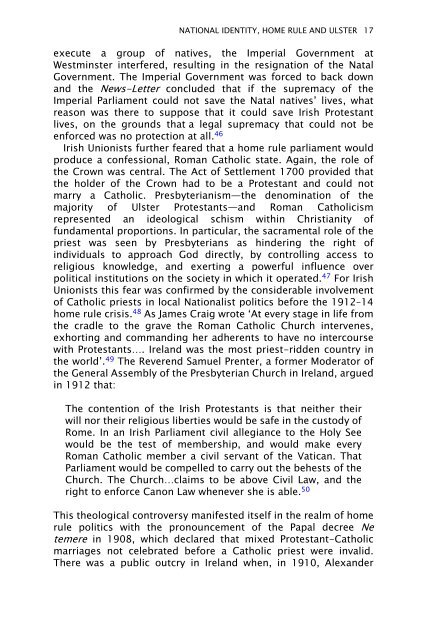Dividing Ireland: World War I and Partition
Dividing Ireland: World War I and Partition
Dividing Ireland: World War I and Partition
You also want an ePaper? Increase the reach of your titles
YUMPU automatically turns print PDFs into web optimized ePapers that Google loves.
NATIONAL IDENTITY, HOME RULE AND ULSTER 17<br />
execute a group of natives, the Imperial Government at<br />
Westminster interfered, resulting in the resignation of the Natal<br />
Government. The Imperial Government was forced to back down<br />
<strong>and</strong> the News-Letter concluded that if the supremacy of the<br />
Imperial Parliament could not save the Natal natives’ lives, what<br />
reason was there to suppose that it could save Irish Protestant<br />
lives, on the grounds that a legal supremacy that could not be<br />
enforced was no protection at all. 46<br />
Irish Unionists further feared that a home rule parliament would<br />
produce a confessional, Roman Catholic state. Again, the role of<br />
the Crown was central. The Act of Settlement 1700 provided that<br />
the holder of the Crown had to be a Protestant <strong>and</strong> could not<br />
marry a Catholic. Presbyterianism—the denomination of the<br />
majority of Ulster Protestants—<strong>and</strong> Roman Catholicism<br />
represented an ideological schism within Christianity of<br />
fundamental proportions. In particular, the sacramental role of the<br />
priest was seen by Presbyterians as hindering the right of<br />
individuals to approach God directly, by controlling access to<br />
religious knowledge, <strong>and</strong> exerting a powerful influence over<br />
political institutions on the society in which it operated. 47 For Irish<br />
Unionists this fear was confirmed by the considerable involvement<br />
of Catholic priests in local Nationalist politics before the 1912–14<br />
home rule crisis. 48 As James Craig wrote ‘At every stage in life from<br />
the cradle to the grave the Roman Catholic Church intervenes,<br />
exhorting <strong>and</strong> comm<strong>and</strong>ing her adherents to have no intercourse<br />
with Protestants…. <strong>Irel<strong>and</strong></strong> was the most priest-ridden country in<br />
the world’. 49 The Reverend Samuel Prenter, a former Moderator of<br />
the General Assembly of the Presbyterian Church in <strong>Irel<strong>and</strong></strong>, argued<br />
in 1912 that:<br />
The contention of the Irish Protestants is that neither their<br />
will nor their religious liberties would be safe in the custody of<br />
Rome. In an Irish Parliament civil allegiance to the Holy See<br />
would be the test of membership, <strong>and</strong> would make every<br />
Roman Catholic member a civil servant of the Vatican. That<br />
Parliament would be compelled to carry out the behests of the<br />
Church. The Church…claims to be above Civil Law, <strong>and</strong> the<br />
right to enforce Canon Law whenever she is able. 50<br />
This theological controversy manifested itself in the realm of home<br />
rule politics with the pronouncement of the Papal decree Ne<br />
temere in 1908, which declared that mixed Protestant-Catholic<br />
marriages not celebrated before a Catholic priest were invalid.<br />
There was a public outcry in <strong>Irel<strong>and</strong></strong> when, in 1910, Alex<strong>and</strong>er








